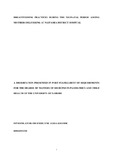| dc.contributor.author | Kegode, Everlyne Agisa | |
| dc.date.accessioned | 2014-01-14T07:15:29Z | |
| dc.date.available | 2014-01-14T07:15:29Z | |
| dc.date.issued | 2013 | |
| dc.identifier.citation | Degree Of Masters Of Medicine In paediatrics and child health of University of Nairobi, 2013 | en_US |
| dc.identifier.uri | http://hdl.handle.net/11295/63498 | |
| dc.description.abstract | INTRODUCTION: Exclusive breastfeeding is among interventions with proven effectiveness in reducing neonatal mortality and 22% of neonatal deaths could be prevented by timely initiation of breastfeeding
JUSTIFICATION: knowing the breastfeeding practices will help strengthen campaigns on exclusive breastfeeding which will be vital in reducing the under 5 mortality and hence in achieving the 4TH MDG
OBJECTIVES: The main objective of this study was to determine neonatal feeding practices at Naivasha District Hospital (use of pre-lacteal feeds, adherence to initiation of breast feeding within an hour of delivery, exclusive breastfeeding in the neonatal period and problems experienced by nursing mothers in the neonatal period. The secondary objective was to assess maternal knowledge on exclusive breastfeeding.
METHODOLOGY: A longitudinal descriptive study that followed up postnatal mothers for a period of 28 days was done. The study population was healthy mothers of healthy term newborns who had been delivered normally. Recruitment of subjects was done in the post natal wards. Mothers were followed up by phone calls at 2 weeks and at 28 days to determine the feeding practices and to determine any challenges they were experiencing. Knowledge on exclusive breastfeeding was assessed by asking mothers to define breastfeeding and state the recommended duration of exclusive breastfeeding. Data was collected using a questionnaire. Data entry was done in Microsoft access and excel data base and analyzed using STATA version 11.0. xii
RESULTS: The study recruited 230 mothers but 207 mother-infant pairs completed the study. Timely initiation of breast feeding occurred in 147 (71%) deliveries while pre-lacteal feeds were given to 63(30.4%) babies. The rate of exclusive breast feeding (EBF) in the cohort was 89.9% (186/207) at 2 weeks declining by 4.4 % to 85.5% (177/207) at week 4.use of prelacteal feeds was significantly associated with reduced exclusive breastfeeding rates at 2 weeks and at 4 weeks. One hundred and forty five (70%) mothers had adequate knowledge on EBF .Adequate maternal knowledge was however not associated with increased exclusive breastfeeding rates. The main problem reported was pain during feeding and this was associated rates with reduced EBF rates (p value<0.001)
CONCLUSION: Knowledge of mothers on exclusive breastfeeding was good however, exclusive breastfeeding rates were lower than expected in the neonatal period and use of prelacteal feeds was common.
RECOMMENDATION: mothers should be assisted to initiate breastfeeding immediately after delivery and be encouraged to sustain exclusive breastfeeding by giving them phone contacts of health care provider at discharge. | |
| dc.language.iso | en | en_US |
| dc.publisher | University of Nairobi, | en_US |
| dc.title | Breastfeeding practices during the neonatal period among mothers delivering at Naivasha District Hospital | en_US |
| dc.type | Thesis | en_US |
| dc.description.department | a
Department of Psychiatry, University of Nairobi, ; bDepartment of Mental Health, School of Medicine,
Moi University, Eldoret, Kenya | |

